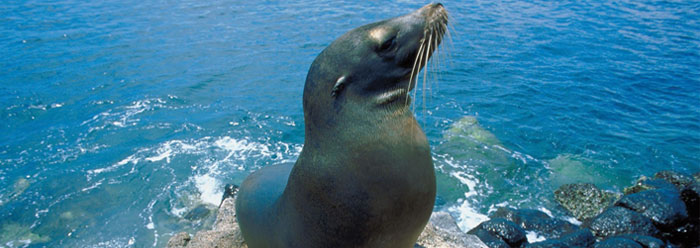The recent discovery of an incomplete northern Canadian fossil is causing waves in certain evolutionary circles.1 Some scientists claim that Puijila darwini is a flipper-free pinniped (a group that includes walruses, sea lions, and seals) that is supposedly a long sought-after Darwinian transition between a land and freshwater animal. But although a BBC headline proclaimed it a "missing link," this status is made doubtful by the article's uncertain verbiage. Terms such as "probably," "very likely," "suggest," "hint," "apparently," "may have," and "appears to have" are used to describe this animal and its characteristics. It is also important to note that a third of this fossil is missing.
The story stated that Puijila holds "the secret of seal evolution in its feet." But when it comes to those critical feet, the author said only that they "were probably webbed." The article also suggested that this "protoseal would have walked on land and swum in fresh water"--but isn't that, with minor variation, what seals do today? The Baikal seal (Pusa sibirica) is a freshwater seal and the Caspian seal (P. caspica) lives in brackish water.
Mary Dawson of the Carnegie Museum of Natural History said, "Puijila is the evolutionary evidence we have been lacking for so long." However, this questionable evidence will no doubt go the way of other false starts in the evolutionarily-interpreted fossil record. It is significant that Dawson admitted there really are gaps in the fossil record (as maintained by non-evolutionists ever since Darwin). Indeed, prior to this dubious discovery, there was (and non-Darwinists maintain, still is) a massive gap between land animals and pinnipeds.
Co-researcher Natalia Rybczynski of the Canadian Museum of Nature presupposed evolution when she said, "It also provides us with a glimpse of what pinnipeds looked like before they had flippers." Evidently Rybczynski considered macroevolution (descent with modification) to be a foregone fact--and then looked for evidence to verify it. This is not how objective science should be conducted.
The article stated that before the discovery of Puijila, "the most primitive fossil pinniped was a creature called Enaliarctos" but this assertion is open to serious question. One evolutionary text discusses "the almost complete skeleton" of Enaliarctos (an undoubted pinniped), but does not include a picture or illustration showing the "numerous anatomical characters that indicate its derivation from terrestrial canoid ancestors."2 Although evolutionist Michael Benton called Enaliarctos a fossil pinniped, he said only that Enaliarctos “retains some features of its terrestrial bear-like ancestors" and then went on to mention the "simplified" teeth.3 Creationists maintain that Enaliarctos, like Puijila, was a pinniped variety--not a transition. After all, from the fragmentary evidence that exists, Puijila had the same features as other pinnipeds--no new features are apparent.
The BBC story concluded, "Darwin forecast the transition from land to sea via fresh water in his seminal work On the Origin of Species, published 150 years ago this year."1 Darwin's predictions are still unfulfilled. According to Benton, "It is hard to imagine how [great blue whales and dolphins] evolved from terrestrial mammal ancestors, and yet that is what happened."4 Indeed, in 2024 Black stated, “Paleontologists are still piecing together how otter-like creatures related to bears evolved into these amphibious marine mammals [Pinnipeds].”5
The pinnipeds are a unique type of marine carnivore designed by the Creator to live in an aquatic environment, with no compelling evidence for any sort of evolutionary background.
References
- Black, R. 'Missing link' fossil seal walked. BBC News. Posted on news.bbc.co.uk April 22, 2009, reporting research published in Rybczynski, N., M. R. Dawson, and R. H. Tedford. 2009. A semi-aquatic Arctic mammalian carnivore from the Miocene epoch and origin of Pinnipedia. Nature. 458 (7241): 1021-1024.
- Colbert, E. H. 2001. Colbert's Evolution of the Vertebrates. New York: Wiley-Liss, 387.
- Benton, M. J. 2015. Vertebrate Palaeontology. Malden, MA: Wiley Blackwell Publishing, 382.
- Ibid, 372.
- Black, R. Why Did Seals and Sea Lions Never Commit to a Life Fully at Sea? smithsonian Posted on smithsonianmag.com March 20, 2024..
* Dr. Sherwin is Senior Science Lecturer at the Institute for Creation Research.
Cite this article: Sherwin, F. 2009. No Seal of Approval for Evolution. Acts & Facts. 38 (6): 16.













